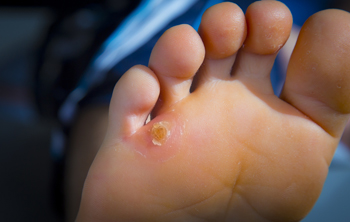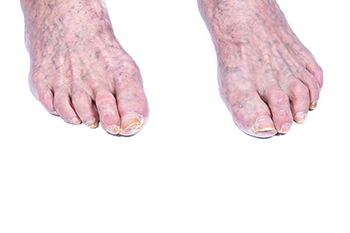
Corns are thickened areas of skin that form due to constant friction or pressure, often from wearing tight shoes or abnormal foot structure. The two main types are hard corns and soft corns. Hard corns typically develop on the top or tip of the toes and contain a dense core of dead skin that can cause pain while walking. Soft corns, also called interdigital corns, usually form between the toes, especially the fourth and fifth toes, where moisture keeps them pliable but still painful. Corns differ from calluses in that calluses are larger, flatter, and tend to form on weight-bearing areas such as the balls of the feet. A podiatrist can assess the cause of corns and provide safe treatment by trimming thickened skin, removing the core, or recommending surgery, if necessary. Recurrent or painful corns may indicate underlying foot deformities that can be addressed by a podiatrist. If you have a painful corn on your foot, it is suggested that you schedule an appointment with a podiatrist for safe and sterile treatment.
Corns can make walking very painful and should be treated immediately. If you have questions regarding your feet and ankles, contact one of our podiatrists of Advanced Ankle & Foot Surgeons. Our doctors will treat your foot and ankle needs.
Corns: What Are They? And How Do You Get Rid of Them?
Corns are thickened areas on the skin that can become painful. They are caused by excessive pressure and friction on the skin. Corns press into the deeper layers of the skin and are usually round in shape.
Ways to Prevent Corns
There are many ways to get rid of painful corns such as:
- Wearing properly fitting shoes that have been measured by a professional
- Wearing shoes that are not sharply pointed or have high heels
- Wearing only shoes that offer support
Treating Corns
Although most corns slowly disappear when the friction or pressure stops, this isn’t always the case. Consult with your podiatrist to determine the best treatment option for your case of corns.
If you have any questions please feel free to contact our office located in O'Fallon, and New Baden, IL . We offer the newest diagnostic and treatment technologies for all your foot and ankle needs.

Foot and ankle pain in teens can result from a variety of causes, often related to growth, physical activity, or underlying conditions. Active teens may experience pain due to overuse injuries from sports or exercise, including stress fractures, tendonitis, or sprains. Growth spurts can lead to conditions like Sever’s disease, where the heel’s growth plate becomes irritated. Wearing improper footwear or lack of support can contribute to arch pain or heel discomfort. Flat feet, high arches, or biomechanical imbalances may also cause strain on joints and soft tissues. In some cases, pain may stem from inflammatory conditions or infections. If your teenager has foot pain, it is suggested that you schedule an appointment with a podiatrist who can determine what the cause is, and offer appropriate treatment solutions.
Foot Pain
Foot pain can be extremely painful and debilitating. If you have a foot pain, consult with one of our podiatrists from Advanced Ankle & Foot Surgeons. Our doctors will assess your condition and provide you with quality foot and ankle treatment.
Causes
Foot pain is a very broad condition that could be caused by one or more ailments. The most common include:
- Bunions
- Hammertoes
- Plantar Fasciitis
- Bone Spurs
- Corns
- Tarsal Tunnel Syndrome
- Ingrown Toenails
- Arthritis (such as Gout, Rheumatoid, and Osteoarthritis)
- Flat Feet
- Injury (from stress fractures, broken toe, foot, ankle, Achilles tendon ruptures, and sprains)
- And more
Diagnosis
To figure out the cause of foot pain, podiatrists utilize several different methods. This can range from simple visual inspections and sensation tests to X-rays and MRI scans. Prior medical history, family medical history, and any recent physical traumatic events will all be taken into consideration for a proper diagnosis.
Treatment
Treatment depends upon the cause of the foot pain. Whether it is resting, staying off the foot, or having surgery; podiatrists have a number of treatment options available for foot pain.
If you have any questions, please feel free to contact our office located in O'Fallon, and New Baden, IL . We offer the newest diagnostic and treatment technologies for all your foot care needs.

Sinus tarsi syndrome is a painful condition that affects the outer part of the foot, specifically in the small cavity between the talus and calcaneus bones. Often resulting from an ankle sprain or repetitive strain, sinus tarsi syndrome leads to inflammation and instability in the area. People with flat feet or who engage in activities like running, dancing, or sports that involve quick turns or uneven surfaces, are more likely to develop sinus tarsi syndrome. Symptoms include persistent, dull pain on the outer foot, along with tenderness and a feeling of instability, which often worsens with activity or walking on uneven ground. Diagnosing this condition typically involves a physical examination and imaging tests like MRI scans. Treatment may include rest, anti-inflammatory medication, and custom orthotics for support. In more severe cases, steroid injections or even surgery may be needed for long-term relief. If you have pain on the outer part of your foot, it is suggested that you schedule an appointment with a podiatrist for a proper diagnosis and appropriate treatment.
Ankle pain can be caused by a number of problems and may be potentially serious. If you have ankle pain, consult with one of our podiatrists from Advanced Ankle & Foot Surgeons. Our doctors will assess your condition and provide you with quality foot and ankle treatment.
Ankle pain is any condition that causes pain in the ankle. Due to the fact that the ankle consists of tendons, muscles, bones, and ligaments, ankle pain can come from a number of different conditions.
Causes
The most common causes of ankle pain include:
- Types of arthritis (rheumatoid, osteoarthritis, and gout)
- Ankle sprains
- Broken ankles
- Achilles tendonitis
- Achilles tendon rupture
- Stress fractures
- Bursitis
- Tarsal tunnel syndrome
- Plantar fasciitis
Symptoms
Symptoms of ankle injury vary based upon the condition. Pain may include general pain and discomfort, swelling, aching, redness, bruising, burning or stabbing sensations, and/or loss of sensation.
Diagnosis
Due to the wide variety of potential causes of ankle pain, podiatrists will utilize a number of different methods to properly diagnose ankle pain. This can include asking for personal and family medical histories and of any recent injuries. Further diagnosis may include sensation tests, a physical examination, and potentially x-rays or other imaging tests.
Treatment
Just as the range of causes varies widely, so do treatments. Some more common treatments are rest, ice packs, keeping pressure off the foot, orthotics and braces, medication for inflammation and pain, and surgery.
If you have any questions, please feel free to contact our office located in O'Fallon, and New Baden, IL . We offer the newest diagnostic and treatment technologies for all your foot care needs.

As individuals age, foot problems become more common and can significantly affect mobility and quality of life. Frailty and decreased motor performance contribute to issues such as reduced balance, slower walking speed, and increased risk of falls. Conditions such as arthritis, neuropathy, and poor circulation can lead to pain, stiffness, and difficulty in movement. Weakening muscles and loss of flexibility in the feet may cause instability, making everyday activities more challenging. Common problems include bunions, corns, calluses, and deformities that worsen with age. Proper foot care, wearing supportive shoes, and regular exercise can help maintain strength and function. If you are elderly and have developed foot conditions or noticed any changes to your feet, it is suggested that you are under the care of a podiatrist who can help you to monitor your foot health.
If you need your feet checked, contact one of our podiatrists of Advanced Ankle & Foot Surgeons. Our doctors will attend to all of your foot and ankle needs and provide you with quality treatment.
Geriatrics and Podiatry
When people age, some common issues that may occur are bone density loss, dry skin, poor circulation, and rough brittle nails. These issues may also affect your foot health if the necessary steps are not taken to alleviate the problems.
It is important to take care of your feet because feet that are injured or diseased can affect your overall health. Having painful feet hinders your ability to do daily activities or may decrease your willingness to do the things that you need to do.
Visiting Your Geriatrician
As we age, health problems become more likely, so it is essential to visit your doctor for check-ups to ensure that you are doing the best you can to take care of your health. It is recommended to check your feet frequently for any possible cuts, bruises, swelling, corns or any other irregularities.
Taking Care of Elderly Feet
Cracked or dry feet can be treated by applying moisturizer often. It is also important not to wear old socks because the older the sock is, the higher the possibility there will be that there is bacteria there. Wear fresh socks and make sure they fit properly.
Proper foot health means that you can have a more active lifestyle and you will not be bogged down by pain. Foot health also leads to good circulation, which is paramount for overall health.
If you have any questions, please feel free to contact our office located in O'Fallon, and New Baden, IL . We offer the newest diagnostic tools and technology to treat your foot and ankle needs.
